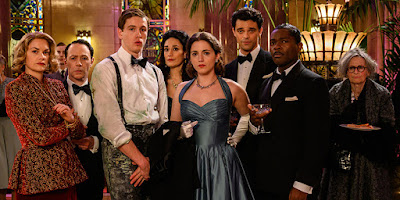or
"So Far, Soporific"
Remember the movie made of Agatha Christie's hit play, "The Mousetrap?" You don't? Well, it's no mystery—the reason why is one has never been made. Oh, there have been unofficial pastiches in foreign markets, but there has never been a filmed version of "The Mousetrap." Legal reasons: When Agatha Christie signed the deal to have it produced it was stipulated in her contract that a movie version wouldn't be made for at least six months after it closed.
And it's been running—at the St. Martin's Theater in London's West End—since October 6, 1952. There was an interruption starting in 2020 due to COVID, and it re-opened on May 17, 2021. It's 27,500th performance was staged on September 18, 2018. The estimation is that there have been 28,500. A running tally exists on a wooden counter in the theater's lobby. And so, because the play has never officially closed, there has never been a film of "The Mousetrap," and may never be.That back-story is the whole raison d'être for See How They Run, a Christie-like mystery pastiche centered around the play and the extraordinary circumstances that start when it celebrates its 100th performance. It is entirely fictional, although some of the actual names are not changed—for example "Dickie"—or Richard as he is better known as actor and director—Attenborough (played by Harris Dickinson) did appear in the first run of the play along with his wife, Sheila Sim (played by Pearl Chanda). And there was a film producer named John Woolf (played by Reece Shearsmith), who did indeed produce The African Queen and bought the movie-rights to "The Mousetrap," anticipating a film adaptation (which never materialized).
Well, on the night of the 100th performance, a celebration party takes place, at which the intended American director for the film-version, Leo Köpernick (Adrien Brody) gets drunk, makes an ass of himself and gets into a fight with (among others) Attenborough. But, he's such a louse that he makes enemies with anyone he makes eye-contact. No surprise, then, that he ends up murdered. Big surprise, though, that he's narrating the film (that is, if you haven't seen Sunset Boulevard—the neat thing about dead narrators is that they know everything, even if their opinions might be wrong).
The police show up: First, Constable Stalker (Saoirse Ronan), who's new and nervous and by-the-book—her own notebook with which she feverishly takes notes that she sometimes can't read; then Inspector Stoppard (Sam Rockwell) bumbles in—he's the rumpled DI in a mac, designed to be underestimated by the unsuspecting suspects: the show's producer (Ruth Wilson) and the disgruntled screenwriter (David Oyelowo) and their hangers-on, the Attenboroughs, and everyone who'd been offended by Köpernick—and that includes everyone.It appears like an open-and-shut case. Kopernick was clobbered by a ski and bludgeoned with a sewing machine in the costume room. But, who is the mysterious figure that is only fleetingly seen around the murder scene...and could be anyone? Well, that's hear-say. And it's only down to Stoppard and Stalker as Scotland Yard is over-taxed dealing with "the Rillington murders" (one of the little in-jokes that abound in the screenplay—Attenborough starred in a film about the case—that are there to tease but lead nowhere).
And that may be part of the issue I have with See How They Run. I enjoy mysteries, not necessarily the solving of them, but the cleverness of the solution—the kind that make you go back and read "that section" that you missed among the chaff of the rest of the story. And, for all its cleverness and jokiness about the form, the central mystery is not all that compelling...and neither are the investigators (despite being played by Ronan and Rockwell). There are so many red herrings—about affairs and ex-wives and duplicitous relationships—and dead-ends that by the time the solution comes out of the wings—oh, it's related to "The Mousetrap" but not relatable to anyone familiar with the play—that one is simply underwhelmed with how it's wrapped up...and in a way that has previously been excoriated earlier in the movie. And Brody's continued role as victim/narrator just makes you wish that murder was possible in the after-life.
There are clever touches—Stoppard's hobby is to make jigsaw puzzles—but even that's a dead end and is just a half-hearted way to give him some "character." Ultimately, I found it not clever in the spine and too clever in the details—when it should be the reverse. If one is going to make a comedy "whodunnit", it should not turn out to be a "whocares." Hoping that Glass Onion and The Menu turn out better.







No comments:
Post a Comment